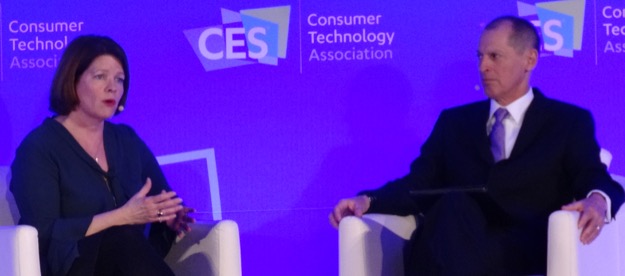
Death threats kept Federal Communications Commission chair Ajit Pai away from CES, but the acting chair of the Federal Trade Commission, Maureen Ohlhausen, sat down for an interview on Tuesday with Consumer Technology Association CEO Gary Shapiro. Her agency is responsible for broadband consumer protection enforcement, after the FCC bucked the job over last month. Appropriately, Shapiro opened with a couple of questions about network neutrality.
Ohlhausen said her concern is transparency – service can be pretty much anything so long as terms are disclosed – and the FTC will look at one basic question: whether consumers get what they’re promised. She made vague references to anti-trust laws and the FTC’s reacquired authority over telecoms companies, now that broadband is no longer reckoned to be a common carrier service (although she neglected to mention that her new found authority is under challenge in court). Ohlhausen’s expertise and jurisdiction are clearly not broadband-specific.
Nevertheless, Shapiro tried to draw Ohlhausen out on broadband issues, noting there are “a hundred different telecommunications companies in Europe” that offer lower priced broadband at a variety of speeds, while the U.S. telecoms market is dominated by four players. Ohlhausen said mobile carriers would provide competition in the future, pointing out that they’re now delivering broadband at speeds that consumers would have considered to be adequate a few years ago.
True. But expectations are higher now and will continue to rise. The 5G networks that Ohlhausen is banking on may deliver speeds that consumers likewise consider adequate today. But those upgrades are many years away for most U.S. residents, and their expectations and their bandwidth consumption will continue to rise. Ohlhausen also forgot to mention that the two biggest mobile companies – AT&T and Verizon – belong to Shapiro’s gang of four.
When the FCC and FTC reached a working agreement on how to divvy up broadband responsibilities, Pai called the FTC “our nation’s premier consumer protection cop”. Perhaps. But Ohlhausen shows little enthusiasm for the job.
